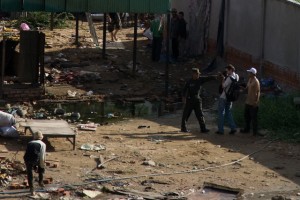Sep 27, 2009 6
Hong Kong Phooey
I’ve left Cambodia and the Phnom Penh Post, and I’ve landed back in Hong Kong with Time Magazine. By and large, it’s been an easy transition back to a city with mass transit, dumplings, and the rule of law, but I’ve really struggled to explain my last year to people.
When people ask what was it like in Cambodia, it’s difficult to whittle it down to a few statements. Sometimes I ham it up for people, and Cambodia has provided enough adventures good bar talk.
I tell people I lived in a coldwater flat that overlooked the spot where a Scottish teacher was shot. I mention that I was punched in the face twice protecting a woman after being pushed off a scooter next to an old torture chamber. I sip my own drink and tell them about downing homemade whiskey with former Khmer Rouge soldiers while trying to smuggle myself across a border. I say that I once woke up to find a tarantula in my toiletries bag, that I rode on the back of strangers’ scooters to go places, that I lived in a house without internet (the horrors!), and that for fun I partied in abandoned mansions with felons.
This is all true, and these stories might impress the person on the bar stool next to me, but it doesn’t really capture what it was like living in Phnom Penh. Between my home and my office, there were four places to buy gourmet muffins. Danger does not lurk around every corner in a city with so many muffin options. I labor on this point, because if you understand Phnom Penh’s muffins, you understand its expat life.
There’s the all-white Fresco’s. With its sleek, minimalist interior and high-prices, the Frescos stand out along the dusty streets of Phnom Penh. It represents the Phnom Penh fabulous life. If you don’t look out the windows, you could be in a posh coffee shop anywhere in the world, and then there’s the Living Room, where all the NGO consultants and freelance journalists go on their laptops. Closest to my apartment was Jars of Clay that was always full of nice old British ladies talking about church. Finally, there’s Java Cafe which doubles as a gallery. Each stands for a different part of the expat scene: the moneyed who miss the luxuries of home, the small army of consultants and freelancers, the religious groups, and the art lovers.
At different times, I frequented all of them. My life in Phnom Penh is better described by its muffins than its muggings. But then again, muffin-shop monologues rarely make good bar talk.

